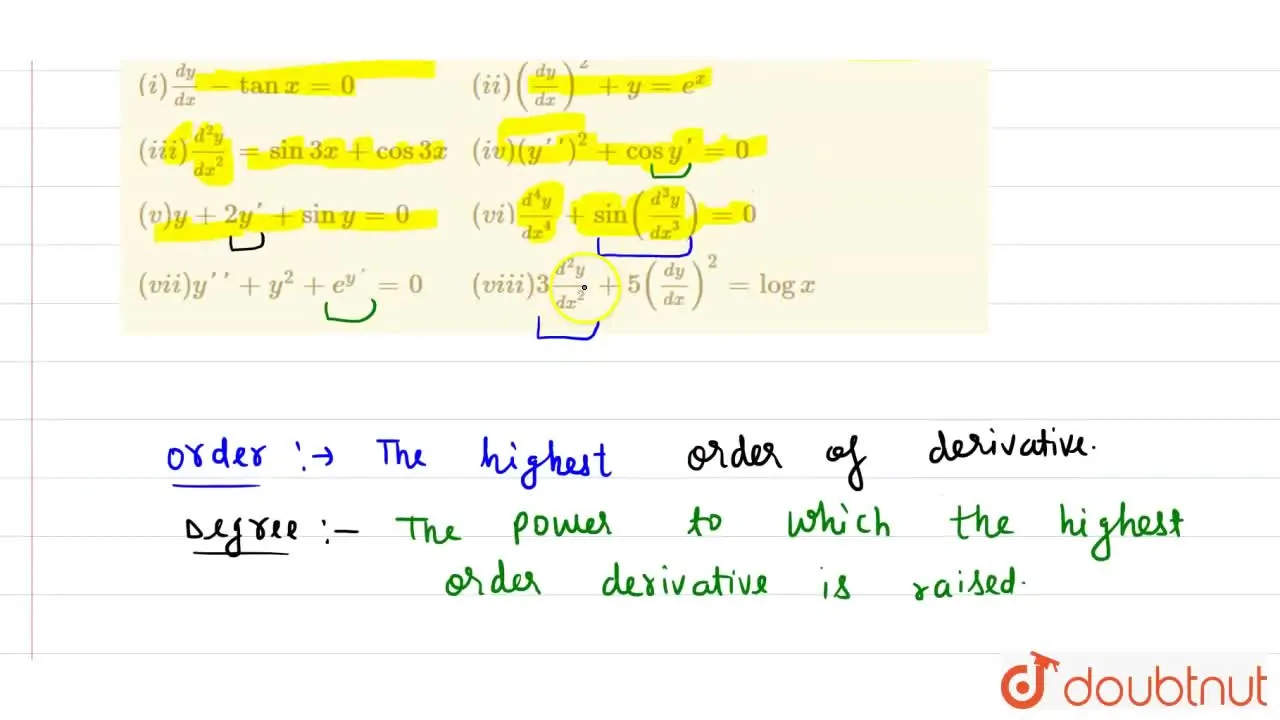Find the order and degree (if any) of each of the differential equations given (i)dydx−tanx=0(ii)(dydx)2+y=ex(iii)d2ydx2=sin3x+cos3x(iv)(y'')2+cosy'=0(v)y+2y'+siny=0(vi)d4ydx4+sin(d3ydx3)=0(vii)y''+y2+ey'=0(viii)3d2ydx2+5(dydx)2=logx
(i) The given equation is dydx−tanx=0. In the this equation, the highest-order derivative is dydx whose power is 1.
∴ its order = 1 and degree =1.
(ii) The given equation is (dydx)2+y=ex. In this equation, the highest-order derivative is dydx whose power is 2.
∴ its order =1 and degree =2.
(iii) The given equation is d2ydx2=sin3x+cos3x. In this equation, the highest-order derivative is d2ydx2 and its power is 1.
∴ its order = 2 and degree =1.
(iv) The given equation is (d2ydx2)+cos(dydx)=0. In this equation, the highest-order dervative is d2ydx2, so its order is 2.
It has a term cos (dydx), so its degree is not defined.
(v) The given equation is d2ydx2+2dydx+siny=0. In this equation, the highest-order derivative is d2ydx2 and its power is 1.
∴ its order = 2 and degree =1.
(vi) The given equation is d4ydx4+sin(d3ydx3)=0. In this equation, the highest-order derivative is d4ydx4, so its order is 4.
It has a term sin(d3ydx3), so its degree is not defined.
(vii) The given equation is d3ydx3+y2+e(dy/dx)=0. In this equation, the highest-order derivative is d3ydx3, so its order is 3.
(viii) The given equation is 3d2ydx2+5(dydx)2=logx. In this equation, the highest-order derivative is d2ydx2 and its power is 1.
∴ its order =2 and degree =1.
Related Playlists
- BOOK - RS AGGARWALCHAPTER - DIFFERENTIAL EQUATIONS AND THEIR FORMATION EXERCISE - Exercise 18A18videos
DIFFERENTIAL EQUATIONS AND THEIR FORMATION
- BOOK - RS AGGARWALCHAPTER - DIFFERENTIAL EQUATIONS AND THEIR FORMATION EXERCISE - Exercise 18B17videos
DIFFERENTIAL EQUATIONS AND THEIR FORMATION
- BOOK - RS AGGARWALCHAPTER - DETERMINANTSEXERCISE - Objective Questions29videos
DETERMINANTS
- BOOK - RS AGGARWALCHAPTER - DIFFERENTIAL EQUATIONS WITH VARIABLE SEPARABLEEXERCISE - Exercise 19B60videos
DIFFERENTIAL EQUATIONS WITH VARIABLE SEPARABLE
Similar Questions
Find the order and degree (if any) of each of the differential equations given (i)dydx−tanx=0(ii)(dydx)2+y=ex(iii)d2ydx2=sin3x+cos3x(iv)(y'')2+cosy'=0(v)y+2y'+siny=0(vi)d4ydx4+sin(d3ydx3)=0(vii)y''+y2+ey'=0(viii)3d2ydx2+5(dydx)2=logx
View SolutionFind the order and degree, if defined, of each of the following differential equations:(i) dydx−cosx=0 (ii) xyd2ydx2+x(dydx)2−ydydx=0 (iii) y'''+y2+ey′=0
View SolutionFind the order and degree of the differential equation .
d2ydx2+x(dydx)3−1=0View SolutionThe degree and order of the differential equation :
2d2ydx−3dydx+y=0 :View SolutionWrite order and degree (if defined) of each of the following differential equations.
(d3ydx3)+(d2ydx2)3+(dydx)4+y5=0View SolutionFind the order and degree of the following differential equations. (i) dydx−sin2y=0 (ii) d4ydx4+sin(d3ydx3)=0
View SolutionWrite the order and the degree of the differential equation d2ydx2+5dydx+3y=0.
View SolutionFind the sum of the order and degree of the differential equation y=x(dydx)3+d2ydx2.
View SolutionWhat is the degree of differential equation d3ydx3+(dydx)2−x2d2ydx2=0
View SolutionThe order of the differential equation
2x2d2ydx2−3dydx+y=0 isView Solution


